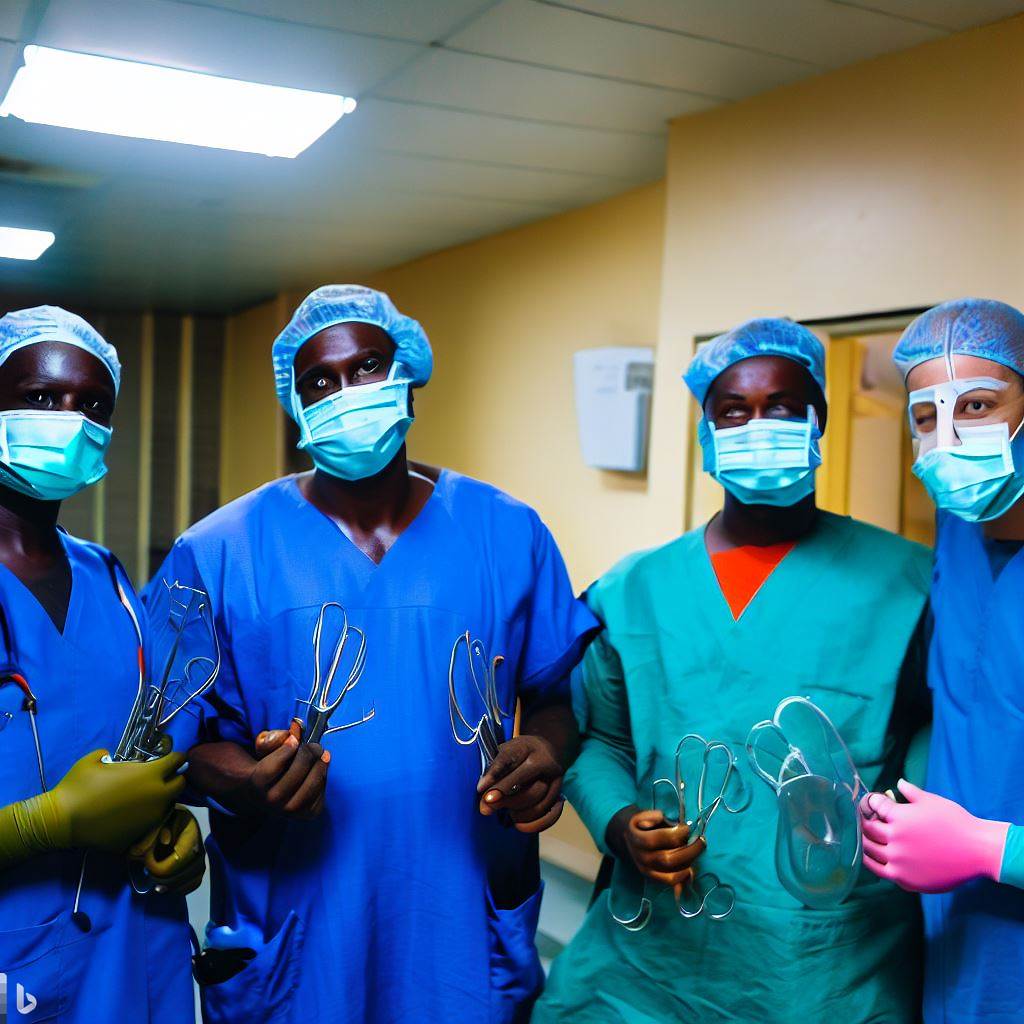Introduction
Expat surgeons, experienced and foreign-trained, are making their mark within Nigeria’s healthcare framework.
Amidst healthcare challenges, Nigeria’s system embraces expat surgeons to enhance medical services and knowledge exchange.
This blog post uncovers the nuanced realm of expat surgeons opportunities and challenges in Nigeria, spotlighting the potential they bring and the obstacles they navigate.
Expat Surgeons in Nigeria: Opportunities
Increased access to specialized surgical care
Expat surgeons play a crucial role in providing specialized surgical care in Nigeria. Their presence has significantly increased access to medical expertise and advanced surgical techniques.
The highly skilled expat surgeons bring a wealth of experience and knowledge that benefits the local population.
Patients now have the opportunity to receive specialized surgical care that may not have been available before.
These expat surgeons are trained in the latest surgical techniques, enabling them to perform complex surgeries with great precision.
Improvement in the quality of surgical outcomes
The quality of surgical outcomes has also improved with the involvement of expat surgeons. Their expertise helps raise the standard of surgical care provided in Nigeria.
This translates to reduced risks and complications during surgeries, leading to better patient outcomes.
The presence of expat surgeons not only benefits individual patients but also raises the overall standard of healthcare in the country.
Contribution to knowledge exchange and capacity building
Furthermore, the contribution of expat surgeons extends beyond the operating theater. They actively engage in knowledge exchange and capacity building with local surgeons.
This transfer of knowledge and skills helps enhance the capabilities of local surgeons, ultimately benefiting the entire healthcare system in Nigeria.
Local healthcare professionals are provided with training opportunities to learn from the expertise of these expat surgeons.
This capacity building further strengthens the healthcare infrastructure and improves the long-term sustainability of surgical services in the country.
The presence of expat surgeons in Nigeria presents numerous opportunities for both patients and healthcare professionals.
Access to specialized surgical care has increased, ensuring that patients receive the highest standard of treatment available.
The improvement in the quality of surgical outcomes enhances patient safety and overall healthcare quality.
Additionally, the knowledge exchange and capacity building fostered by expat surgeons contribute to the development of local healthcare professionals.
The skills and expertise gained from these interactions will have a lasting impact on the healthcare system in Nigeria.
In the end, the presence of expat surgeons in Nigeria brings valuable opportunities to the country’s healthcare system.
The increased access to specialized surgical care, improvement in surgical outcomes, and knowledge exchange contribute to the overall advancement of healthcare in Nigeria.
It is crucial to support and encourage the involvement of expat surgeons to foster sustainable growth and development in the field of surgical care.
Read: Surgery Practice in Nigeria: Ethical Considerations
Expat Surgeons in Nigeria: Challenges
Expat surgeons in Nigeria bring about various challenges that affect patients, particularly in terms of cost, accessibility, and the state of the local healthcare system.
Cost implications for patients
Expat surgeons charge higher fees compared to local surgeons, making healthcare more expensive. Affordability concerns arise for low-income individuals who may not be able to access surgical care.
The cost implications for patients become a concern, as expat surgeons typically charge higher fees compared to their local counterparts.
This disparity in fees can make healthcare unaffordable for many low-income individuals who require surgery.
The affordability gap in healthcare services hinders equitable access to surgical care across different socioeconomic strata in Nigeria.
Limited accessibility for rural populations
Expat surgeons are concentrated in urban areas, making it difficult for rural populations to access their services. Remote regions lack proper surgical services, causing difficulties for those living in these areas.
Furthermore, expat surgeons are concentrated in urban areas, which poses a challenge for rural populations.
The lack of accessibility to these surgeons makes it difficult for those in remote regions to receive necessary surgical treatment.
Limited transportation infrastructure and long travel distances exacerbate this problem, leaving many rural communities underserved in terms of surgical care.
Read: Top Institutions to Study Phlebotomy in Nigeria
Brain drain effect on local healthcare system
Skilled Nigerian surgeons are lost to other countries, contributing to the brain drain phenomenon.
Dependency on expat surgeons increases as specialized care may not be readily available from local healthcare professionals.
An additional challenge presented by the presence of expat surgeons is the brain drain effect on the local healthcare system.
Skilled Nigerian surgeons often leave the country to seek better opportunities abroad, resulting in a loss of talent and expertise within the healthcare sector.
This drain of skilled professionals perpetuates the dependency on expat surgeons for specialized care, further compounding the challenges faced by patients in Nigeria.
In addressing these challenges, it is important for the Nigerian government and healthcare institutions to develop policies and initiatives that promote the training and retention of local surgeons.
Encouraging investment in rural healthcare infrastructure and providing incentives for surgeons to practice in remote areas can help improve access to surgical services for underserved populations.
Additionally, efforts should be made to bridge the affordability gap by exploring alternative funding mechanisms, such as health insurance schemes and subsidies for low-income individuals.
Encouraging collaboration between local and expat surgeons through knowledge-sharing programs can also contribute to building local capacity and reducing dependency on expat surgeons for specialized care.
By addressing the challenges associated with expat surgeons in Nigeria, the healthcare system can work towards providing more equitable and accessible surgical care for all of its citizens, regardless of their location or socioeconomic status.
Read: Innovations in MRI Technology: Implications for Nigerian Techs

Steps to Address Challenges and Optimize Opportunities
Expat surgeons in Nigeria play a vital role in improving the nation’s healthcare system. Nonetheless, there are both opportunities and challenges that need to be addressed for better outcomes.
Encouraging collaboration and knowledge sharing
Promote partnerships between expat and local surgeons for skill exchange. Facilitate training programs and mentorship opportunities to enhance expertise.
One key step to foster growth and progress is to encourage collaboration and knowledge sharing among expat and local surgeons.
This can be achieved through partnerships, enabling skill exchange, and enriching expertise through training programs and mentorship opportunities.
Read: The Path to Becoming a Surgeon in Nigeria
Increasing investments in healthcare infrastructure
Expand surgical facilities and equipment in rural areas for accessibility. Obtain government support for infrastructure development to strengthen healthcare provisions.
Moreover, investing in healthcare infrastructure is crucial for extending the reach of surgical facilities, especially in rural areas.
Expanding and upgrading surgical centers with modern equipment will ensure better access to medical services for the underserved population.
To achieve this, government support in funding infrastructure development is essential.
Enhancing regulation and affordability of healthcare services
Implement policies to regulate fees charged by expat surgeons for fair pricing. Support health insurance initiatives for wider coverage and affordability to all.
Furthermore, regulating the fees charged by expat surgeons is vital to maintain affordability for patients.
Implementing policies that set reasonable and transparent pricing will prevent exploitation and ensure equitable access to healthcare services.
In addition to regulation, promoting health insurance initiatives can significantly increase access to medical care.
A wider coverage under health insurance schemes will allow more Nigerians to avail themselves of surgical treatments without financial burdens.
In essence, addressing challenges and optimizing opportunities for expat surgeons in Nigeria requires a concerted effort from various stakeholders.
Encouraging collaboration, increasing investments in infrastructure, and enhancing regulation and affordability are key steps towards building a robust healthcare system that benefits all citizens.
By taking these actions, Nigeria can unlock the full potential of its expat surgeons and improve healthcare outcomes nationwide.
Read: Breaking Barriers: Women Pediatricians in Nigeria
Conclusion
Expatriate surgeons face both opportunities and challenges while practicing in Nigeria. It is crucial to address the challenges and maximize the opportunities for expat surgeons.
There is hope for a balanced and sustainable healthcare system in Nigeria if these issues are effectively managed and expat surgeons have various opportunities than challenges.




